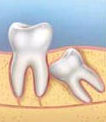
Wisdom Teeth
Wisdom Teeth are called the upper and lower third molars. They are the last of the molar teeth, which are the large grinding teeth at the back of each side of the jaws.
The permanent teeth start to erupt from the age of six. Up to the age of 17, the permanent dentition will consist of only twenty-eight teeth. The four remaining teeth, the wisdom teeth, will come in later, usually during late teen years or early twenties.
Wisdom Teeth problems
In many people, wisdom teeth come in with no problems. If the teeth are healthy and they come in straight, then most of people do not even realize the teeth are there. Unfortunately, in some cases, they cause problems that require the wisdom teeth removal (extraction) by a dentist or an oral and maxillofacial surgeon.
Since wisdom teeth are the last permanent teeth to erupt, there is often not enough room left in the mouth for them to erupt properly.
The problems that often occur with wisdom teeth are :
- If the jaw is not large enough to accommodate all the teeth that are growing in, the teeth will not be able to come through the gums as they get stuck,
most often against the tooth in front, and so they remain below the jawline. Those teeth that are unable to erupt properly, trapped beneath the gum tissue
by other teeth or bone, are called impacted wisdom teeth.
The impacted wisdom teeth may cause pain as they press the other teeth, but in some cases you may feel nothing at all for years or not even be aware that you have an impacted wisdom tooth. In other cases the impacted tooth may damage the tooth next to it, or the gums around the wisdom tooth can become infected and quite painful. Swelling and tenderness may also occur.
- A wisdom tooth might also erupt only partially, if it gets stuck just when going through the gumline. In this case, food, plaque and bacteria can become trapped under the flap of gum covering part of the tooth, causing infections. Inflammation of this flap is called pericoronitis and is the most common symptom among people who need a wisdom tooth extraction. Wisdom teeth that only partially emerge or come in crooked can also lead to painful crowding and gum disease.
- Wisdom teeth problems also occur when they do not come in straight. Sometimes they erupt crooked, facing the wrong direction and causing irritation on the cheek, tongue, or other parts of the mouth. This can make it difficult to keep the wisdom teeth clean. Since the area between the tooth and gums becomes hard to reach and be cleaned very well, there is increased risk of irritation or infection of that area due to dental plaque accumulation.
Symptoms related to wisdom teeth problems
- Gum disease or decay on the wisdom teeth or those near it
- Swelling and infection
- Pain and stiffness in the jaw and over the tooth
If any of these symptoms are present, a dentist can diagnose the problem by examining the teeth and doing an x-ray. If the dentist finds that there is a problem, he will usually recommend the wisdom teeth removal.
Wisdom Tooth extraction
Regular dental visits are important during teen years and early twenties because they allow your dentist to follow the progress of your wisdom teeth with X-rays.
An early evaluation of possible wisdom teeth problems by your dentist is important as it is easier to remove a wisdom tooth in someone who is up to his early twenties. At this point, the jawbone and the roots of the wisdom teeth are not fully developed. Wisdom teeth removal after this time, can be a more difficult and painful procedure. It will also take longer for the periodontal tissues to heal from the wisdom tooth extraction.
People who have problems such as infection, cysts, tooth decay, or gum disease around a wisdom tooth should visit their dentist who will usually recommend the wisdom tooth removal. People who have impacted wisdom teeth that are not causing problems do not need to have them removed.
There are also some dentists who believe in preventively removing the wisdom teeth prior to any problems. Removing wisdom teeth is easier in younger people because the tooth roots are not fully developed and the bone in which the teeth sit is less dense. Wisdom teeth extraction before any complications develop also allows for shorter recovery time and less discomfort after the surgery.
![]() The cost of dental treatments related with impacted wisdom teeth can be significant and many patients may not afford it if they are not covered by their dental insurance.
Learn how to choose a dental insurance plan that will provide the best dental treatment to you and your family.
The cost of dental treatments related with impacted wisdom teeth can be significant and many patients may not afford it if they are not covered by their dental insurance.
Learn how to choose a dental insurance plan that will provide the best dental treatment to you and your family.



